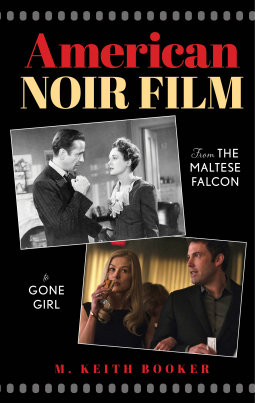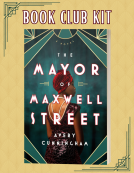
American Noir Film
From The Maltese Falcon to Gone Girl
by M. Keith Booker
This title was previously available on NetGalley and is now archived.
Buy on Amazon
Buy on Waterstones
*This page contains affiliate links, so we may earn a small commission when you make a purchase through links on our site at no additional cost to you.
Send NetGalley books directly to your Kindle or Kindle app
1
To read on a Kindle or Kindle app, please add kindle@netgalley.com as an approved email address to receive files in your Amazon account. Click here for step-by-step instructions.
2
Also find your Kindle email address within your Amazon account, and enter it here.
Pub Date 19 Nov 2024 | Archive Date 19 Nov 2024
Rowman & Littlefield | Rowman & Littlefield Publishers
Talking about this book? Use #AmericanNoirFilm #NetGalley. More hashtag tips!
Description
A deep dive into classic noir films and how filmmakers today are refreshing and updating the genre for new generations.
In American Film Noir, M. Keith Booker introduces readers to the cult-favorite genre of film noir and discusses the ongoing power and popularity of the genre’s key elements and themes in modern films, often considered neo-noir, well into the twenty-first century. Booker covers a wide range of noir favorites, from the early classics The Maltese Falcon and The Big Sleep, to late twentieth-century neo-noir such as Chinatown,and ultimately newer iterations of the genre as seen in such films as Inherent Vice, Promising Young Woman, and Uncut Gems. American Film Noir contains three separate parts, each exploring crucial categories of noir: the detective film, the lost man film, and femme fatale films. Within each section, Booker discusses the essential classic noir films that embody these themes as well as neo-noir films that invite viewers to analyze how the traditional components of noir have evolved with filmmaking. Finally, each section concludes with twenty-first-century films that evoke noir elements while refreshing the genre and enhancing viewers’ appreciation of the originals that inspired them—what Booker terms “revisionary noir.” Whether new to noir films, students of the genre, or long-time fans, readers will be sure to learn what makes this genre so special, discover why filmmakers keep coming back to it, and find a new favorite movie to add to their shelves.
M. Keith Booker is the author or editor of over sixty books including Mad Men: A Cultural History (Rowman & Littlefield, 2016), Tony Soprano’s America: Gangsters, Guns, and Money (Rowman & Littlefield, 2017), Star Trek: A Cultural History (Rowman & Littlefield, 2018), and The Coen Brothers’ America (Rowman & Littlefield, 2019). He is professor of English at the University of Arkansas.
A Note From the Publisher
This title views best in tablet-style eReaders.
This is a set of uncorrected page proofs. It is not a finished book and is not expected to look like one. Errors in spelling, page length, format and so forth will all be corrected by the time the book is published several months from now. Photos and diagrams, which may be included in the finished book, may not be included in this format. Uncorrected proofs are primarily useful so that you, the reader, might know months before actual publication what the author and publisher are offering. If you plan to quote the text in your review, you must check it with the publicist or against the final version. Please contact reviews@rowman.com with any questions. Thank you!
This is a set of uncorrected page proofs. It is not a finished book and is not expected to look like one. Errors in spelling, page length, format and so forth will all be corrected by the time the book is published several months from now. Photos and diagrams, which may be included in the finished book, may not be included in this format. Uncorrected proofs are primarily useful so that you, the reader, might know months before actual publication what the author and publisher are offering. If you plan to quote the text in your review, you must check it with the publicist or against the final version. Please contact reviews@rowman.com with any questions. Thank you!
Available Editions
| EDITION | Hardcover |
| ISBN | 9781538194096 |
| PRICE | US$45.00 (USD) |
| PAGES | 224 |
Available on NetGalley
NetGalley Shelf App (PDF)
Send to Kindle (PDF)
Download (PDF)
Readers who liked this book also liked:
The National Trust Book of Nature-Friendly Gardening
Rebecca Bevan and National Trust Books
Health, Mind & Body, Home & Garden, Outdoors & Nature
Rebecca Bevan and National Trust Books
Health, Mind & Body, Home & Garden, Outdoors & Nature


















